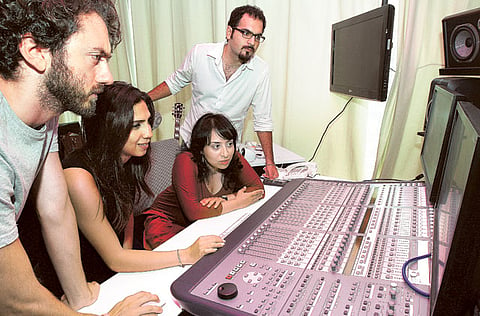Crowd funding makes it easier for local artists
Financing concept is still new to the region

Dubai: Sabah Haidar thought she had the backing of private organisations to provide $10,000 to make her film ‘Abu Rami’.
“When they realized the theme of my film was controversial, they backed out; so crowd funding was my only option,” said Haidar, an independent film-maker.
Crowd funding allows independent artists or start-ups to get the public’s support in funding their projects through websites that contains information about their work. “The challenge I faced is people in the Middle East are just not familiar with the concept of crowd funding,” said Haidar.
“In the US, people are more used to contributing to invest projects but people here are reluctant, not necessarily because they do not want to support, but because they are not used to the idea of putting money towards the making of art.”
Research by Massolution reckon that crowd funding volumes will double this year to $2.8 billion, but there are doubts as to whether it is going to be as successful in the region.
“By nature it seems to be quite a grass-roots and small-scale affair,” said Matthew Reed, principal analyst at MENA Informa Telecoms and Media. “Within those constraints there seems no reason why it couldn’t lead to some successful projects,
“Legal uncertainties around the ownership of the projects could be an obstacle for it becomes unknown for supporters whether the projects are for private hobbies or companies with a certain legal status and obligations.”
Unlike Haidar, Dubai-based independent musician Gayathri Krishnan used the American crowd funding website Indiegogo to raise $20,000 for her first full-length album. She got the funds in the first ten days and by the end of the month, raised $23,000.
“I think it has a lot to do with your campaign and how to use social networking such as Facebook and Twitter to raise awareness among people and spread the word,” said Krishnan.
Krishnan will release her album in November and has promised her supporters incentives such as sound bytes in one of her tracks, personalized shirts or musician credit, depending on the amount of money they offered.
The Artistic Director for Dubai International Film Festival and Gulf Film Festival Masoud Amralla Al Ali believes crowd funding allows filmmakers to retain control of their intellectual property.
“Crowd funding is more flexible, the artist is in control of what they can give their supporters in return in the form of rewards - these are often money cannot buy type rewards such as a walk on part in a movie or a special thanks credit on a film for example,” said Al Ali.
Reed said it is difficult to get financing for ventures like film-making through conventional routes such as bank loans, which makes crowd funding easier for artists.
While Vida Rizq, the founder of the crowd funding site Aflamnah, says crowd funding provides a less risky way for artists to fund their projects where they have nothing to lose if their projects did not get enough support.
Haidar previously uploaded a description of her film on Indiegogo and raised $4,000 out of $10,000. She got the post-production expenses and half of the production costs through a company in the UAE and is raising the rest through Aflamnah, which takes 6 per cent of the fund achieved.
“Sabah’s story is a very Arabic story, so it was difficult to get international audiences excited about it. I believe she has a better chance of getting more supporters regionally because connections play an important role of success,” said Rizq.
Sherouk Zakaria is an intern with Gulf News.



